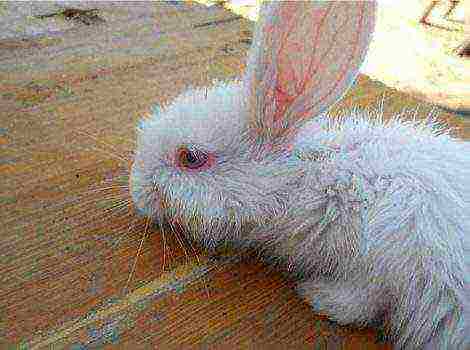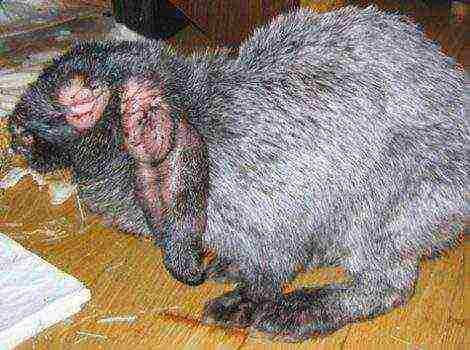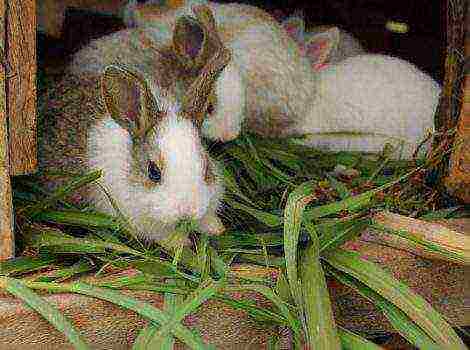Content [show]
Three types of rhinitis in rabbits: treatment and prevention
Rabbit runny nose or rhinitis is one of the most common and unpleasant diseases for pets and their owners.
Much has been written about the causes of its occurrence, prevention and treatment methods, however unified, detailed and detailed instructions for the breeder will not hurt.
Why did the rabbit start sneezing and a runny nose?
Under the symptoms of a common runny nose and sneeze in rabbits several diseases can be hidden:
- allergic reaction;
- cold;
- rhinitis is a dangerous infectious disease.
The most dusty food is hay., from which the rabbit begins to sneeze. It is not recommended to keep cages with rabbits in dusty places, since the respiratory system of eared pets is very delicate and often reacts to unfavorable environmental factors.
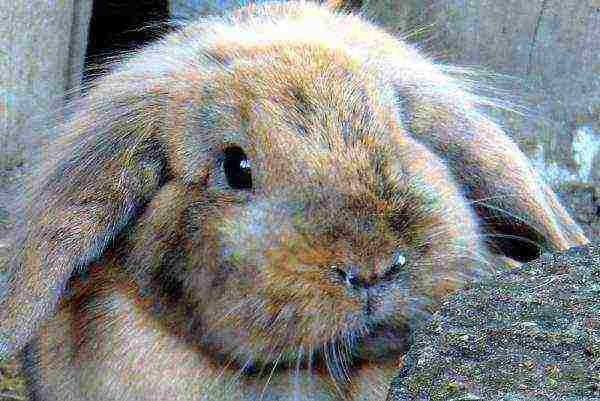
Getting rid of allergies is not difficult, you just need to protect rabbits from irritating product, that is, dust. Other causes of allergies are extremely rare, and only narrow specialists are engaged in their study.
The second source of a runny nose is the common cold.... The reasons for its occurrence are associated with improper care:
- keeping rabbits in damp, cold and blown rooms;
- general weakness of the body caused by a lack of vitamins, a poor diet.
Rhinitis is caused by infection... It can be transmitted from a sick rabbit to a healthy one by airborne droplets or through the use of common utensils. Cases of transmission of infection to rabbits from other domestic animals (chickens, dogs) are known.
Weakened immunity, the presence of a chronic cold, contacts with others, including strangers, are fertile ground for the development and spread of rhinitis.
How rhinitis develops
The first symptoms of rhinitis are noticeable after a few days. after infection. It is possible to accurately determine the presence of the disease in 5-7 days. Rhinitis can occur in different ways.
The worst case is fatal in 1.5-2 months.
Development of chronic rhinitis is also possible.... In this case, it is difficult to determine the timing of the course of the disease. Practice knows cases when infected rabbits lived up to 1.5 years, and after slaughter, the meat in general was suitable for human consumption.
Why is chronic rhinitis dangerous? Danger of chronic rhinitis in that it can turn into pneumonia and lead to complete dysfunction of the bronchi, which leads to the death of the animal. You cannot eat the meat of such a rabbit.
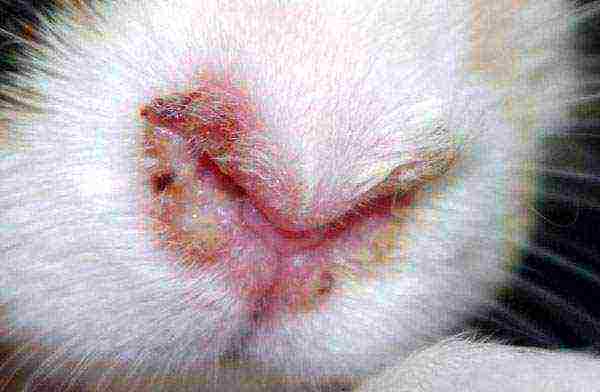
Symptoms of the disease
Sneezing and snot is the first and earliest alarm.... At the first hints of a sick rabbit, it is advisable to remove it from its fellows.
In a healthy rabbit, the nasal mucosa is pale pink. If it turns red, it grows in size (inflamed), nasal discharge begins to acquire a yellowish, purulent hue, then these are sure signs of rhinitis at the initial stage.
In the future, even more pronounced symptoms appear, which are noticeable even to a person who is very far from rabbit breeding. The cheeks of rabbits are stained with dried pus.
A sick rabbit begins to scratch his nose diligently, which is why a characteristic crust appears on it. Holding of breath, wheezing, high fever, refusal to eat, weight loss are obvious symptoms of chronic advanced rhinitis.
How to treat snot (infectious rhinitis) in a rabbit
Only a veterinarian can absolutely accurately determine the presence of rhinitis or a common runny nose in a rabbit., for which a blood test is performed. Therefore, treatment always starts with general measures, which are often more effective than medications.
Sick rabbit should be isolated, and all inventory is sanitized. Disinfection is carried out with ordinary boiling water.
If there is formalin in the house, then a 3% solution cope well with the destruction of the infection.
The second point is nutrition. There are always vitamins in the veterinary pharmacy that the rabbit may lack.... Adding them to food, as well as a variety of diets, will help boost immunity and increase the chances of recovery.
If the measures taken are not enough and the condition of the sick pet does not improve, then start treatment, for which folk remedies and medicines are suitable.
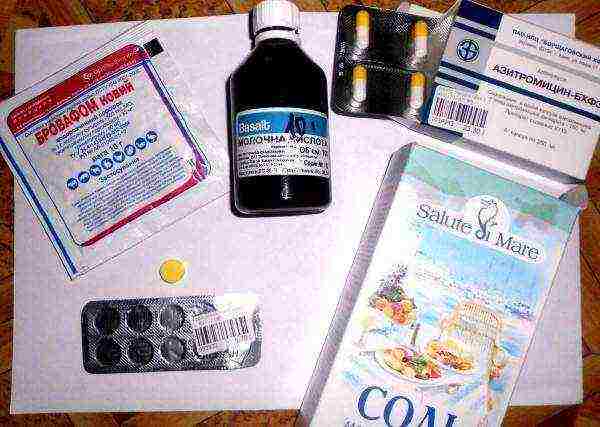
There are many methods of treatment, so let's focus on the main ones.
Instillation of penicillin or furacilin... The drugs are available and inexpensive, penicillin can be replaced by analogs of its own group. A solution of penicillin or furacilin is pipetted into the rabbit's nose.
The procedure can be repeated 2-3 times a day for 10-12 days. A single dose of 10-15 drops.
Since rabbits are not very fond of burying, it is ideal if they help you to hold the rabbit tightly, since it is inconvenient for one person to perform the entire procedure.
You may be interested in the following articles on rabbit diseases:
- Symptoms, treatment and prevention of coccidiosis in rabbits.
- Symptoms and treatment of myxomatosis in rabbits.
- Causes and treatment of bloating in rabbits
Adding biomycin to food... Biomycin is not an expensive and proven drug; after stirring it in warm water, it is added to food by the eared ones.
Standard dose for 1 rabbit is 1 mg per day... In case of serious diseases, the dose is increased by 2-2.5 times. The drug works quickly, so the rabbits will recover in 4-5 days.
Inhalation with essential oils or herbal decoction... The inhalation course lasts up to 7 days. For treatment are used: decoctions of mint, sage, fennel, thyme, eucalyptus oil, sea buckthorn, lavender, cloves.
When using oil, a dosage of 1 drop per 2 liters of water is maintained.
For inhalation, the rabbit must be planted in a small cage. with permeable walls. A saucepan or other container with hot broth is placed next to it (but inaccessible to the rabbit).
The cage and pan are covered (wrapped) so that the rabbit can breathe in pairs. The concentration and temperature of the broth are checked empirically.
If the eyes do not pinch and the temperature is tolerable, then this is the best option for a rabbit. Do not forget about the fresh air gap.
And the patient can be occupied, for which it is advisable to put a bowl with plain water and food in the cage. The frequency of inhalations is 1-2 per day.
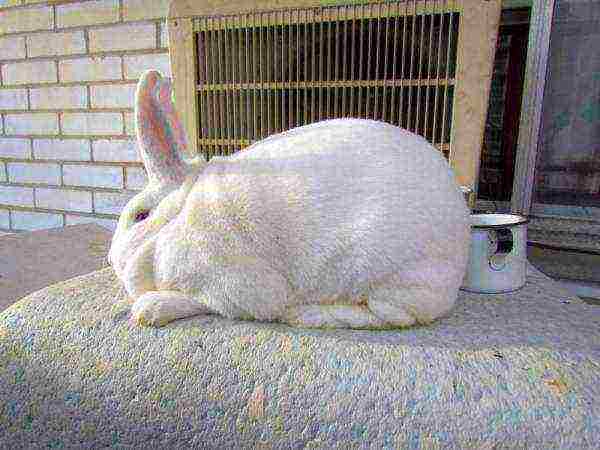
After inhalation, nasal discharge will become more abundant.... To alleviate the condition of the rabbit, it is advisable to wipe them with a towel or paper napkin.
There is also a cold inhalation method.... It is performed according to the instructions sold with special devices. You can buy such a device at a veterinary pharmacy.
Sea salt vapors are considered very effective for cold inhalations.
With rhinitis, antibiotic injections are also prescribed.... There are more than a dozen effective drugs.However, given the danger of antibiotics for a rabbit, it is advisable to inject them only after a blood test and consultation with a veterinarian.
An invalid diet
There are no restrictions on the diet of a sick rabbit with rhinitis. And here diversify the diet, add vitamins, greens to it (slightly dried) is desirable.
A rabbit with a runny nose needs even more warmth... Therefore, in the cold season, they do this: sick rabbits are taken to a house or other warm buildings.
What to do for prevention
The best way to avoid a runny nose - these are the right conditions for keeping pets, especially in winter. A warm room, no drafts, no dampness, vitamins and a varied diet.
As special preventive measures biomycin is added to the food of rabbits (0.5 grams per day for 1 rabbit)... Dill, mint, chamomile, wormwood, and basil also have antiviral effects.
Summing up, it should be emphasized that preventing rhinitis in pets is much easier than treating it later.
Moreover, practice knows a lot of examples when even antibiotics do not help the complete recovery of animals.
